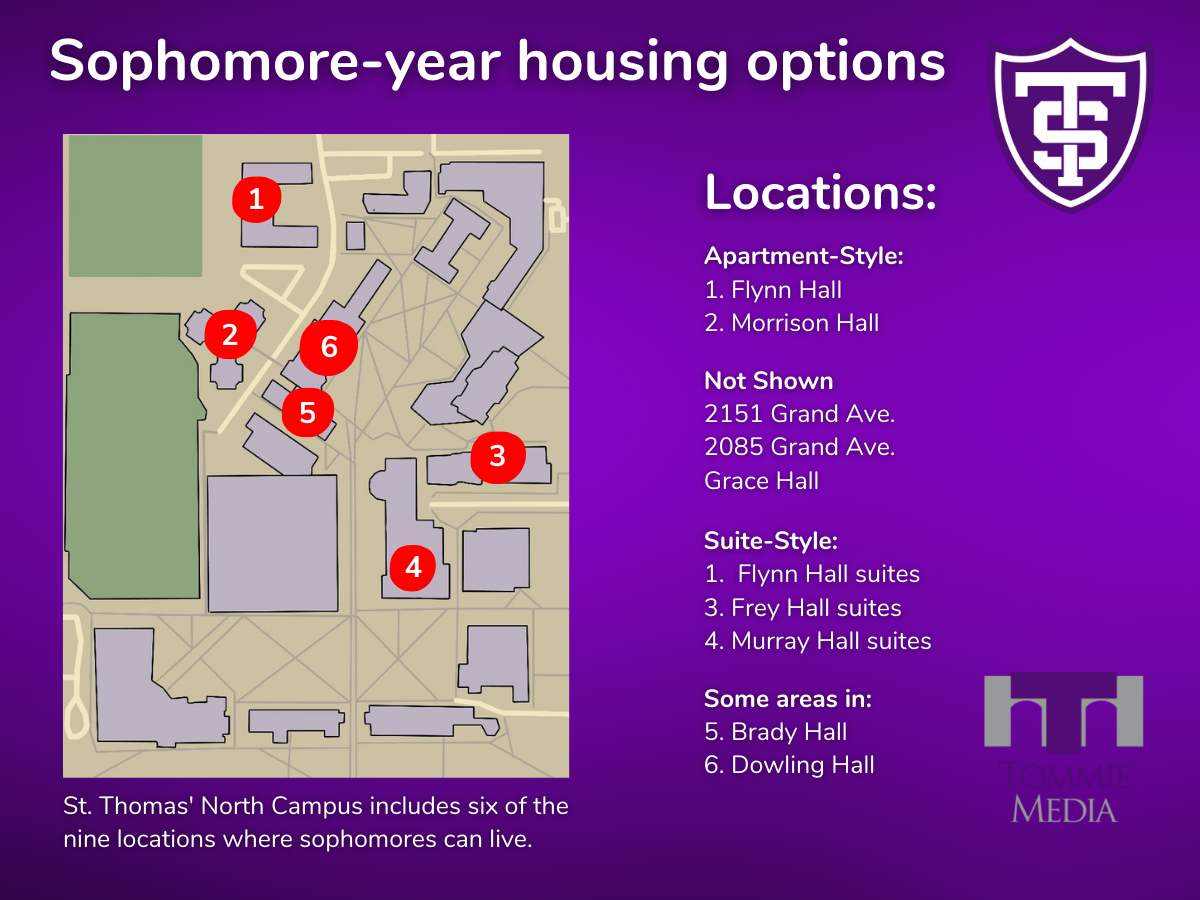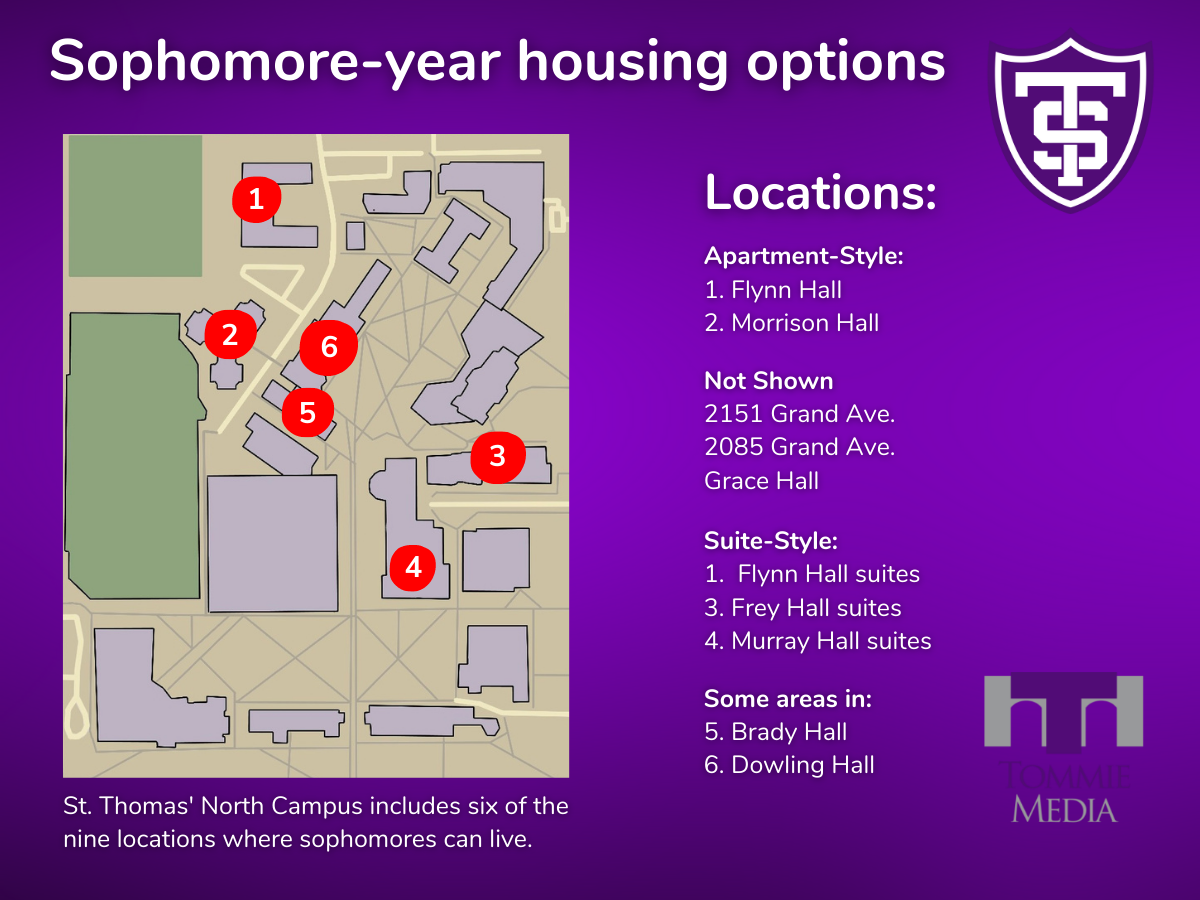
The University of St. Thomas’ new requirement that second-year students live on-campus beginning in the fall 2022 semester left many first- and second-year students scrambling to choose from the housing options available in an April 6 lottery selection process that “disappointed” some students.
The two-year residency requirement has been in the works since 2015 when St. Thomas’ 2020 Strategic Plan included the idea as a way to encourage community engagement and provide support for second-year students.
“Our Catholic peer institutions had residency requirements; our incoming families were calling and emailing us also expecting us to have one, our local community/neighbors were asking us to consider adding this requirement, and our parents were voicing concerns about their first-year student not being guaranteed on-campus housing in their second year,” Associate Dean of Students and Director of Residence Life Aaron Macke wrote in an email to TommieMedia on March 31.
While the new requirement may have the support of families and parents, it has been unpopular with many students and the lottery-style selection process left some unsatisfied.
“I’ve heard people kind of upset and disappointed about the whole process of selection,” first-year Ellie Johnson said. “I think (the two-year residency requirement) takes away from the freedom and imposes a lot more rules on us as sophomores in college that I feel we shouldn’t have to deal with.”
According to St. Thomas’ residency requirement webpage, the intended benefits of the change include:
– Developing a sense of belonging to the campus community
– Creating meaningful connections with students, staff and faculty that support a student’s academic journey
– Experiencing co-curricular learning aligned with the Tommie Advantage
– Engaging in campus events and taking advantage of campus resources
– Guaranteeing housing on campus for a student’s first two years
While the university stated that the change would help in “guaranteeing housing on campus for a student’s first two years,” claims that not every student was able to secure a room on campus spread throughout the student body following the selection.
Macke, however, said that this was only a rumor.
“We have housing for everyone,” Macke said in an interview with TommieMedia. “Anyone who went in to select that night had a bed to choose from, but what you are getting as a vibe from the students is that, ‘it wasn’t the bed I wanted.’”
Using a lottery-style system, the university assigned students with specific times to select housing. The students were notified of their selection date on April 5 and were able to choose between three different styles of housing on April 6.
“We’ve done random lotteries in the past; it’s not uncommon for us to do it, but again we have never had 1,100 people in a lottery,” Macke said. “Our housing system generates selection times automatically. … All 1,100 names go in and it spits out selection times that range anywhere from 4 o’clock in the afternoon till 9 o’clock in the evening.”
Options included apartment-style housing in Flynn Hall, Morrison Hall, 2151 Grand Ave. and 2085 Grand Ave., suite-style housing in Flynn Hall, Frey Hall, Murray Hall and Grace Hall and dorm-style housing in Brady Hall and Dowling Hall.
“We told the students that they are all going to end up in one of those, so make sure to have a Plan A, a Plan B and a Plan C because when you go in, it might not be available,” Macke said.
Exemptions were allowed in some cases. Requirements for an exemption to the residency requirement include: living with a parent or legal guardian; being married and/or caring for a dependent; having medical conditions that cannot be accommodated on campus; and being 21 or older.
First-year Grace Carlson took issue with the exception process, however.
“They made it seem like nobody could get exemptions unless it was for an extreme reason, but they ended up giving people exemptions for reasons not listed,” first-year Grace Carlson said. “If I would’ve known it would be that easy, I would have applied.”
Fox felt that the exemption process was unclear and that the qualifications were not broad enough.
“Personally I didn’t do a medical exemption, but I know people that did and it got denied,” Fox said. “If I would have done a medical exemption, you can’t tell me that my mental health is wrong.”
On the night of selection, the university received multiple emails questioning housing priorities. Some students have speculated that some received special treatment.
“We have heard of people who went in crying to get an apartment, and they said they would reserve an apartment for them,” Fox said.
However, the university has made it known to the community that they did not prioritize any students.
“We had a mix of rumors that came out of that night. … There’s not much we can do about that but shut it down and let people know that it is not true,” Macke said. “It was a completely random lottery – nobody got priority. Not even legacy or families who have had siblings graduate.”
Macke expects students to have more housing options as some did not participate in the initial process.
“Everyone has housing. We did have a group of people who have not participated in the process at all. They didn’t fill out a roommate candidate and go on the form that night,” Macke said, “Every year we have anywhere from 10 to 12% of our first-year class not returning. Whatever it might be, we still will assign them to a bed until we have heard a withdrawal. That will then open more available for those who might want to switch.”
Once numbers change, St. Thomas plans on doing another lottery that is in reverse order of the original, allowing students to select from rooms that may have been filled previously.
“We are going in reverse lottery order, so those who were later in the selection time will now be at the top,” Macke said.
Along with the residency requirement, the university is also implementing a sophomore year experience course for second-year students beginning in the 2022-23 academic year.
“We put so much energy as an institution into that first-year orientation and first-year experiences. However, that second year can be really hard, and there are some big decisions that second years have to make,” Macke said. “So that’s kind of where that residency requirement comes in, is … building a sense of community camaraderie with our second-year students.”
Annabelle Wiskus can be reached at wisk9881@stthomas.edu.



